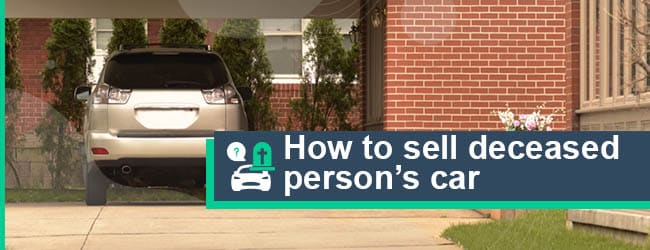Quick Answer:
How long you can drive a deceased person’s car depends on multiple factors, such as the laws of the state where the car is registered and the specific terms of the deceased’s will, if one exists.
In general, most states allow 30 30-day grace period to use the vehicle.
Driving a car past the grace period might result in fines, jail time and license suspension.
Key Takeaways:
- The estate administrator or executor and immediate family are legally allowed to drive the deceased person’s car until the Title transfer is complete.
- To transfer title, a death certificate, original Certificate of Title, and probate documents will be required.
- It is not necessary to notify DMV about the owner’s death as this information is shared via Social Security records.
Best for Older & Damaged Cars

Buys used, damaged or junk cars
Free tow and no hidden fees
Pays by ACH trasfer or check
Top Pick for Junk Cars

Free, no-obligation cash offers
Offers free paperwork service
Pays on the spot upon pick up
Is It Legal to Drive a Car of a Deceased Person?
Driving a deceased person’s car without transferring ownership is generally illegal.
However, most states allow a 30-day grace period in order to handle their affairs within that period.
During this time, it is crucial to carry the necessary documents, such as the death certificate and proof of insurance, to demonstrate your legal right to use the car if stopped by law enforcement.
Who Can Drive the Deceased Person’s Car?
Legally driving a deceased person’s car typically requires the individual to be either an executor or a personal representative of the estate, with permission granted through the probate process.
1. Estate administrator or executor
If a deceased person left a will, probate will appoint the legal executor of the will. Having this status allows you to drive a car legally.
However, if there is no will, the court will assign an estate administrator and permission to manage the vehicle.
2. Immediate family
Similar to the estate administrator, immediate family members usually handle affairs related to the deceased person’s estate.
For example, If the purpose is to manage or fix any cases related to the deceased person, then immediate family members can legally use the deceased person’s car.
The following are considered immediate family members:
- Spouse
- Children
- Parents
- Siblings
Risks of Driving a Car of a Deceased Person
Driving a deceased person’s car past the grace period presents several risks, primarily legal and financial.
Risks of driving a car past the grace period:
- Personal liability for accidents: The driver may be held personally liable for any damages or injuries if the vehicle is involved in an accident, especially if insurance coverage is invalidated due to unresolved ownership issues.
- Legal consequences: Driving a deceased person’s car without proper registration and title transfer can result in fines, criminal charges, and potentially jail time, depending on state laws.
- Insurance complications: The vehicle’s insurance policy may not cover incidents occurring after the owner’s death, leading to significant financial risks if the car is involved in an accident.
- Expired registration risks: If the vehicle’s registration expires during the grace period or probate, driving it becomes illegal, exposing the driver to potential fines, penalties, and legal complications for operating an unregistered vehicle on public roads.
- Decreased estate value: Driving the deceased person’s car during probate could potentially decrease the vehicle’s value due to additional mileage, wear and tear, or any damages incurred during this period, thereby impacting the beneficiaries’ inheritance.
- Conflict among heirs: Unauthorized use of the vehicle by one party can lead to disputes among the heirs or beneficiaries of the estate, complicating the probate process.
It’s advisable to wait until the probate process is complete and the title has been officially transferred to ensure all use of the vehicle is legally sound and covered by insurance.
Penalties for driving a deceased person’s car:
| State | Maximum fine | Jail time | License Suspension |
|---|---|---|---|
| Alabama | $500 | 30 Days | Up to 6 Months |
| Alaska | $500 | 30 Days | Up to 6 Months |
| Arizona | $500 | 30 Days | Up to 6 Months |
| Arkansas | $500 | 30 Days | Up to 6 Months |
| California | $500 | 30 Days | Up to 6 Months |
| Colorado | $500 | 30 Days | Up to 6 Months |
| Connecticut | $500 | 30 Days | Up to 6 Months |
| Delaware | $500 | 30 Days | Up to 6 Months |
| Florida | $1,000 | 60 Days | Up to 1 Year |
| Georgia | $5,000 | 1 Year | Up to 4 Years |
| Hawaii | $500 | 30 Days | Up to 6 Months |
| Idaho | $500 | 30 Days | Up to 6 Months |
| Illinois | $500 | 30 Days | Up to 6 Months |
| Indiana | $500 | 30 Days | Up to 6 Months |
| Iowa | $500 | 30 Days | Up to 6 Months |
| Kansas | $500 | 30 Days | Up to 6 Months |
| Kentucky | $500 | 30 Days | Up to 6 Months |
| Louisiana | $500 | 30 Days | Up to 6 Months |
| Maine | $500 | 30 Days | Up to 6 Months |
| Maryland | $500 | 30 Days | Up to 6 Months |
| Massachusetts | $500 | 30 Days | Up to 6 Months |
| Michigan | $500 | 30 Days | Up to 6 Months |
| Minnesota | $500 | 30 Days | Up to 6 Months |
| Mississippi | $500 | 30 Days | Up to 6 Months |
| Missouri | $500 | 30 Days | Up to 6 Months |
| Montana | $500 | 30 Days | Up to 6 Months |
| Nebraska | $500 | 30 Days | Up to 6 Months |
| Nevada | $500 | 30 Days | Up to 6 Months |
| New Hampshire | $500 | 30 Days | Up to 6 Months |
| New Jersey | $500 | 30 Days | Up to 6 Months |
| New Mexico | $500 | 30 Days | Up to 6 Months |
| New York | $500 | 30 Days | Up to 6 Months |
| North Carolina | $500 | 30 Days | Up to 6 Months |
| North Dakota | $500 | 30 Days | Up to 6 Months |
| Ohio | $500 | 30 Days | Up to 6 Months |
| Oklahoma | $500 | 30 Days | Up to 6 Months |
| Oregon | $500 | 30 Days | Up to 6 Months |
| Pennsylvania | $500 | 30 Days | Up to 6 Months |
| Rhode Island | $500 | 30 Days | Up to 6 Months |
| South Carolina | $500 | 30 Days | Up to 6 Months |
| South Dakota | $500 | 30 Days | Up to 6 Months |
| Tennessee | $500 | 30 Days | Up to 6 Months |
| Texas | $2,000 | 180 Days | Up to 2 Years |
| Utah | $500 | 30 Days | Up to 6 Months |
| Vermont | $500 | 30 Days | Up to 6 Months |
| Virginia | $500 | 30 Days | Up to 6 Months |
| Washington | $500 | 30 Days | Up to 6 Months |
| West Virginia | $500 | 30 Days | Up to 6 Months |
| Wisconsin | $500 | 30 Days | Up to 6 Months |
| Wyoming | $500 | 30 Days | Up to 6 Months |
How To Transfer Car Title After Death Of Owner
Transferring a car title after the death of the owner requires navigating specific legal processes, which can vary significantly by state.
The essential paperwork commonly includes:
- An order from the probate court authorizing the vehicle’s transfer
- The original certificate of title
- The deceased owner’s death certificate
- Odometer disclosure statement.
Steps to facilitate the Title transfer:
- Obtain the death certificate: This document is crucial for proving the owner’s death and is required in all legal proceedings related to the estate.
- Locate the Certificate of Title: Essential for establishing the car’s ownership. This document needs to be in hand for the transfer process.
- Identify the beneficiary: If the deceased left a will, the vehicle’s beneficiary is the individual named therein. In the absence of a will, state intestacy laws determine the rightful heir.
- Proceed with probate: Probate is necessary to validate the will, appoint an executor, and legally transfer the deceased’s assets, including vehicles.
- Settle any outstanding obligations: Check for and clear any unpaid fees or taxes associated with the vehicle as required by state law.
- Complete the title transfer documents: Prepare all necessary paperwork for submission to the relevant state department or motor vehicle registry.
- Pay the transfer fee: The cost and processing time of title transfers can vary, with fees typically ranging from $10 to $20 and the process taking between 2 to 6 weeks.

Title Transfer Fees
Transferring the title of a deceased person’s car involves several fees that vary depending on the state and specific circumstances of the estate.
Basic Title Transfer fee: title transfer fees can range from as low as $10 to over $100, with most fees falling into the $20 range.
Inspection fee: inspection fees may be required as part of the process, depending on the state. These inspections can include safety inspections, smog certifications, and odometer disclosures to ensure that the vehicle meets state regulations before the ownership is transferred.
Registration fee: When transferring a title, the new owner often needs to register the vehicle. Fees vary from $9.50 (Arizona) to $225 (Florida), with an average of $52.
Additional state-specific fees: Many states impose additional fees, such as an annual Electric Vehicle (EV) fee in Illinois of $251 or a lien fee in Pennsylvania of $26. These additional costs can include emissions exemption fees, greenhouse gas fees, and county-specific taxes or fees.
How Soon Should You Transfer the Title of a Deceased Person’s Car?
The process and timing for transferring the title of a deceased person’s car can vary significantly depending on the state and specific circumstances.
Generally, if the vehicle is part of a probated estate, you cannot transfer the title until the probate process is completed.
On average, the probate process can take about a year from the date of the person’s death to the distribution of the estate. However, even simple estates usually require a minimum of six months to complete the probate process.
If the estate is not going through probate, perhaps because of a will or other estate planning measures, transferring the title can be quicker. This might involve providing the car title and the deceased owner’s death certificate to the local Title Office.
Should You Notify the DMV When a Person Dies?
It’s recommended to notify the DMV when a person dies to cancel their driver’s license or ID, which helps prevent identity theft and fraud.
While the DMV eventually learns of the death through Social Security records, directly notifying the DMV allows for quicker cancellation of the deceased’s license, registration, and other DMV-related items.
What Happens to Car Insurance After Owner Dies?
After the death of a car owner, the auto insurance policy needs to be addressed promptly to ensure the vehicle remains covered and to avoid potential issues.
The policy usually needs to be canceled or transferred, and this requires informing the insurance company of the policyholder’s death.
The procedure varies based on your relationship with the deceased and the terms of the policy. For example, a surviving spouse may be able to transfer the policy to their name.
To avoid legal issues, it’s critical not to drive the vehicle until the insurance matter is resolved. Families typically have about 30 days to notify the insurer.
Failure to notify the insurer and manage the policy accordingly could lead to the insurance company’s refusal to approve the claim, leaving the family financially responsible.
What Happens to a Financed Car when Someone Dies?
When someone dies with an outstanding car loan, the debt doesn’t just disappear – it becomes part of the deceased’s estate.
The handling of this debt depends on various factors, including whether the deceased had a co-signer on the loan and the laws of the state where the deceased lived.
- Handling of the Car Loan: The estate of the deceased is responsible for the debt. If there are sufficient assets, the estate pays off the car loan. If the estate cannot cover the debt, the situation may vary depending on whether there was a co-signer and the state’s laws regarding debt inheritance.
- Car Loan Death Clause: Some car loan agreements include a death clause that outlines what happens with the loan upon the borrower’s death. This may allow for the loan to be transferred or refinanced by a surviving family member if they wish to keep the car.
- Co-Signer’s Responsibility: If there was a co-signer on the loan, they would typically be responsible for the remaining loan balance if the estate cannot pay it off. The lender may also repossess the car if payments are not made.
- Community Property States: In community property states (e.g., Arizona, California, Idaho, Louisiana, Nevada, New Mexico, Texas, Washington, Wisconsin), the surviving spouse may be responsible for the debt, even if they were not a co-signer or co-borrower.
- Probate and Financed Cars: The probate process will determine who is responsible for a financed car. The executor or administrator of the estate will use the estate’s assets to pay ongoing bills, including car payments until the estate is settled. This could include selling the car to pay off debts or transferring the car to a beneficiary if the estate can cover the loan.
- Repossession After Death: Lenders may repossess the vehicle if payments stop and the loan cannot be settled through the estate. However, voluntary repossession is also an option if no one wishes to take over the loan payments.
- Options for Inherited Financed Cars: Beneficiaries may have the option to continue payments, pay off the loan with the estate’s assets, refinance the loan into their name, or sell the car to cover the loan balance.
It’s important to communicate with the lender to understand your options and obligations. Consulting an estate attorney can also provide clarity on how to proceed based on your specific situation and state laws.
What Happens to a Car When Someone Dies Without a Will?
Dying without a will is known as dying “intestate,” and each state has its own laws (intestate succession laws) that determine how the deceased’s assets are distributed.
Generally, the estate will have to go through probate, a court-supervised process to settle the deceased’s estate and distribute their assets according to state law.
In cases where a car is the only or main asset, some states allow for the transfer of the vehicle title without going through the full probate process.
In some cases, the car may be sold and the proceeds will be distributed among the heirs, depending on rules set by law.
It’s important to consult with a legal professional or the DMV in your state to understand the specific requirements and options available for transferring a car title when someone dies without a will.
Can You Sell a Deceased Person’s Car Without Probate?
It’s possible to sell a deceased person’s car without going through probate in certain cases. This depends on the legal provisions available in your state and the specific circumstances of the deceased’s estate.
Here’s a general overview:
- Transfer on Death (TOD) Addendum: If the car’s title includes a TOD provision naming a beneficiary, this allows the car to bypass probate and go directly to the named individual. To sell the car, the beneficiary typically needs to present a copy of the death certificate and possibly a letter from the court stating the estate does not require probate.
- Affidavit of Heirship: An affidavit of heirship may be used to facilitate the transfer of the vehicle’s title without probate. This document usually requires signatures from disinterested parties who can attest to the deceased’s family history and heirs. The process involves filing the affidavit with relevant state or local agencies, such as the Department of Motor Vehicles (DMV).
- Small Estate Affidavit: For estates below a certain value threshold, which varies by state, a small estate affidavit can be an option to transfer assets, including vehicles, without probate. This affidavit must be filed with the court, and upon approval, it allows for the direct transfer of the vehicle to the heirs or designated beneficiaries.
- Joint Ownership with Right of Survivorship: If the vehicle was jointly owned with someone else under a “joint tenancy with right of survivorship” arrangement, the surviving owner automatically becomes the sole owner of the vehicle upon the death of the other owner, allowing them to sell the vehicle without going through probate.





